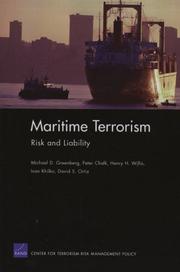| Listing 1 - 10 of 20 | << page >> |
Sort by
|
Book
ISBN: 013038836X Year: 1971 Publisher: Englewood Cliffs, N.J. : Prentice-Hall,
Abstract | Keywords | Export | Availability | Bookmark
 Loading...
Loading...Choose an application
- Reference Manager
- EndNote
- RefWorks (Direct export to RefWorks)
Differential equations. --- Green's functions. --- Green's functions

ISBN: 0133214311 0137904525 Year: 1998 Publisher: Upper Saddle River Prentice Hall
Abstract | Keywords | Export | Availability | Bookmark
 Loading...
Loading...Choose an application
- Reference Manager
- EndNote
- RefWorks (Direct export to RefWorks)
51-7 --- #TWER:MOD --- Mathematical studies and methods in other sciences. Scientific mathematics. Actuarial mathematics. Biometrics. Econometrics etc. --- Engineering mathematics. --- 51-7 Mathematical studies and methods in other sciences. Scientific mathematics. Actuarial mathematics. Biometrics. Econometrics etc. --- Engineering mathematics --- Engineering --- Engineering analysis --- Mathematical analysis --- Mathematical studies and methods in other sciences. Scientific mathematics. Actuarial mathematics. Biometrics. Econometrics etc --- Mathematics
Book
ISBN: 0833047264 0833047981 9780833047984 9780833047267 Year: 2009 Publisher: Santa Monica Rand Center for Corporate Ethics and Governance
Abstract | Keywords | Export | Availability | Bookmark
 Loading...
Loading...Choose an application
- Reference Manager
- EndNote
- RefWorks (Direct export to RefWorks)
In March 2009, RAND convened a conference on the role and perspectives of corporate chief ethics and compliance officers (CECOs). The discussions featured input from current and former officers and other stakeholders in the nonprofit sector, academia, and government. Themes included the unique position of CECOs in corporate management, the relevance of ethics and culture as a prophylaxis to malfeasance, and the importance of open communication and employee reporting in guarding against fraud and misconduct.
Business ethics --United States --Congresses. --- Corporate governance --Moral and ethical aspects --United States --Congresses. --- Corporations --Corrupt practices --United States --Prevention --Congresses. --- Corporations --- Corporate governance --- Business ethics --- Social Welfare & Social Work --- Criminology, Penology & Juvenile Delinquency --- Social Sciences --- Corrupt practices --- Prevention --- Moral and ethical aspects --- Governance, Corporate --- Business corporations --- C corporations --- Corporations, Business --- Corporations, Public --- Limited companies --- Publicly held corporations --- Publicly traded corporations --- Public limited companies --- Stock corporations --- Subchapter C corporations --- Business --- Businesspeople --- Commercial ethics --- Corporate ethics --- Corporation ethics --- Professional ethics --- Industrial management --- Directors of corporations --- Business enterprises --- Corporate power --- Disincorporation --- Stocks --- Trusts, Industrial --- Wealth --- E-books

ISBN: 128118098X 9786611180980 0833042564 1433709457 0833040308 9780833042569 9781281180988 9780833040305 9781433709456 6611180982 Year: 2006 Publisher: Santa Monica, CA : RAND Center for Terrorism Risk Management Policy,
Abstract | Keywords | Export | Availability | Bookmark
 Loading...
Loading...Choose an application
- Reference Manager
- EndNote
- RefWorks (Direct export to RefWorks)
This book focuses on the study of terrorism risk and liability issues in connection with two general types of maritime terrorism scenarios: attacks that target passenger vessels and attacks that target (or leverage) containerized shipping. With regard to analyzing liability, the authors explore underlying threats, vulnerabilities, and potential consequences, constructing a picture of the relative risks posed by different terrorism scenarios.
Container ships. --- Hijacking of ships. --- Merchant marine. --- Passenger ships. --- Pirates. --- Shipping. --- Terrorism. --- Merchant marine --- Shipping --- Passenger ships --- Container ships --- Maritime terrorism --- Pirates --- Hijacking of ships --- Military & Naval Science --- Law, Politics & Government --- Navigation --- Security measures --- Prevention --- Security measures. --- Prevention. --- Ships --- Barbary corsairs --- Corsairs --- Freebooters --- Containerships --- Liners --- Mercantile marine --- Hijacking --- Piracy --- Outlaws --- Buccaneers --- Terrorism --- Cargo ships --- Merchant ships --- Unitized cargo systems --- Marine service
Book
ISBN: 0130115525 Year: 1988 Publisher: Englewood Cliffs, N.J. Prentice-Hall
Abstract | Keywords | Export | Availability | Bookmark
 Loading...
Loading...Choose an application
- Reference Manager
- EndNote
- RefWorks (Direct export to RefWorks)
51-7 --- #WBIB:dd.Lic.L.De Busschere --- 51-7 Mathematical studies and methods in other sciences. Scientific mathematics. Actuarial mathematics. Biometrics. Econometrics etc. --- Mathematical studies and methods in other sciences. Scientific mathematics. Actuarial mathematics. Biometrics. Econometrics etc. --- Algebra --- Mathematical analysis --- Numerical analysis --- Mathematical statistics --- Mathematical physics
Book
Year: 1998 Publisher: New Jersey (N.J.): Prentice Hall,
Abstract | Keywords | Export | Availability | Bookmark
 Loading...
Loading...Choose an application
- Reference Manager
- EndNote
- RefWorks (Direct export to RefWorks)
Book
ISBN: 9781118230022 Year: 2012 Publisher: Hoboken, N.J. : Wiley,
Abstract | Keywords | Export | Availability | Bookmark
 Loading...
Loading...Choose an application
- Reference Manager
- EndNote
- RefWorks (Direct export to RefWorks)
"After a brief review of first-order differential equations, this book focuses on second-order equations with constant coefficients that derive their general solution using only results described previously. Higher-order equations are provided since the patterns are more readily grasped by students. Stability and fourth order equations are also discussed since these topics typically appear in further study for engineering and science majors. In addition to applications to engineering systems, applications from the biological and life sciences are emphasized. Ecology and population dynamics are featured since they involve both linear and nonlinear equations, and these topics form one application thread that weaves through the chapters. Diffusion of material, heat, and mechanical and electrical oscillators are also important in biological and engineering systems and are discussed throughout. A complete Instructor Solution Manual is available upon request and contains solutions to all exercises as well as Maple[trademark symbol] code. While the book is not dependent on the use of one specific software, some of the exercises do call on the use of such systems to solve certain differential equations or to plot the results. A Student Solutions Manual is available to supplement the book, and while the first manual will feature Maple, the author is also preparing versions using Mathematica and MATLAB;to accommodate instructor preferences. Chapter coverage includes First-Order Differential Equations; Higher-Order Linear Equations; Applications of Higher-Order Linear Equations; Systems of Linear Differential Equations; Laplace Transform; Series Solution; Systems of Nonlinear Differential Equations; and Appendices on Partial Fraction Expansions, Determinants, Gauss Elimination, and Complex Numbers and the Complex Plane"--
Differential equations --- Differential equations, Partial --- Mathematics --- Differential Equations.

ISBN: 013011118X Year: 2001 Publisher: Upper Saddle River, N.J. Prentice Hall
Abstract | Keywords | Export | Availability | Bookmark
 Loading...
Loading...Choose an application
- Reference Manager
- EndNote
- RefWorks (Direct export to RefWorks)
Book
Year: 2011 Publisher: Santa Monica, CA : ©2011 RAND Corporation,
Abstract | Keywords | Export | Availability | Bookmark
 Loading...
Loading...Choose an application
- Reference Manager
- EndNote
- RefWorks (Direct export to RefWorks)
"The Dodd-Frank Wall Street Reform and Consumer Protection Act, signed into law in July 2010, includes a new mechanism for offering financial awards to internal corporate "whistleblowers" who report instances of fraud to the U.S. Securities and Exchange Commission (SEC). Final whistleblower rules enacted by the SEC under the statute have been controversial, particularly in neglecting to require that corporate insiders make use internal corporate reporting channels as a prerequisite to eligibility for any subsequent bounty under Dodd-Frank. On May 11, 2011, RAND convened thought leaders and stakeholders from the government, industry, academic, and nonprofit sectors to discuss the potential impact of the Dodd-Frank whistleblower rules on corporations, the importance of internal compliance and reporting processes both for corporations and the regulatory community, and steps that might be taken to strengthen internal compliance and reporting in the era of Dodd-Frank. These proceedings summarize key issues and topics from the symposium and identify major points of agreement and disagreement among the participants. The proceedings also feature three invited papers presented at the symposium."--Publisher's website
Corporate governance --- Whistle blowing --- Financial services industry --- Securities fraud --- Law and legislation --- United States.
Book
Year: 2012 Publisher: Santa Monica, CA : RAND Corporation,
Abstract | Keywords | Export | Availability | Bookmark
 Loading...
Loading...Choose an application
- Reference Manager
- EndNote
- RefWorks (Direct export to RefWorks)
"In 1991, in recognition that the acts of individuals can create criminal liability for their organizations, the U.S. Sentencing Commission expanded the Federal Sentencing Guidelines to include a new chapter on organizational crime. The intent was twofold: to provide a consistent set of guidelines to deter and punish organizational crime and to encourage positive behavior --- specifically, the establishment of effective corporate compliance programs. In the two decades since, one of the chief aims of the guidelines has been to encourage basic cultural change within organizations in ways that might reduce both criminal and ethical risk. On May 16, 2012, RAND brought together a group of public company directors and executives, chief ethics and compliance officers, and stakeholders from the government, academic, and nonprofit sectors for a series of conversations about organizational culture, as well as to explore the business and policy ramifications of efforts to build better ethical cultures in corporations. The symposium discussions featured a range of viewpoints on the history and progress of compliance initiatives, the barriers to achieving a strong ethical culture, and what corporate boards, executives, and compliance and ethics officers, and policymakers can do to cultivate such cultures. Participants put forward a range of solutions, many of which sought to overcome the common tendency to view compliance as a legal issue more so than a cultural one."--Publisher's description
Business ethics --- Corporations --- Corporate governance --- Corporate culture --- Moral and ethical aspects
| Listing 1 - 10 of 20 | << page >> |
Sort by
|

 Search
Search Feedback
Feedback About UniCat
About UniCat  Help
Help News
News